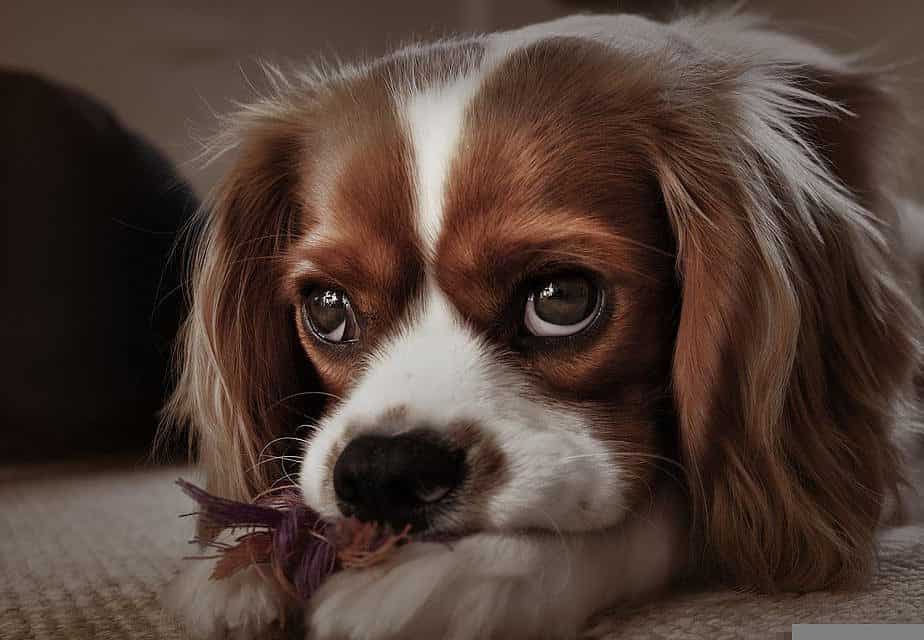
Snoring and respiratory problems are common for Cavalier King Charles Spaniels, bulldogs, Pekingese, and other flat-faced breeds.
Cavalier King Charles Spaniels snore and snort because they have brachycephalic airways, including flat noses, narrow nares, and underdeveloped tracheas. Snoring can be benign but should be evaluated by a veterinarian, especially if the dog has breathing difficulties.
It is important to understand how the anatomy of your Cavalier affects the dog’s ability to breathe and engage in normal activities of daily living.
Brachycephalic Airway Syndrome
Brachycephalic airway syndrome is the most common cause of snoring and respiratory problems in Cavalier King Charles Spaniels and all flat-faced breeds. The anatomy of brachycephalic dogs can present issues and obstruct normal, easy breathing.
The key features of brachycephalic airway syndrome include the following:
- A long soft palate that extends beyond the tip of the epiglottis and makes the passage of air difficult
- Narrow nares: often they collapse inward during inhalation, which makes it hard for the dog to breathe through the nose
- Hypoplastic trachea, or an airway that collapses easily
- Everted laryngeal saccules: the tissue inside the airway, in front of the vocal cords, is pulled into the trachea and partially obstructs airflow
- Improper teeth alignment is a distinct issue but is very common for brachycephalic dogs and contributes to snoring
Other Issues Common for Flat-Faced Breeds
Several problems are associated with brachycephalic syndrome, and your dog may have some too. Most of those signs are more concerning than snoring itself:
- Snorting
- Coughing
- Gagging
- Vomiting or regurgitating food
- Difficulty eating
- Low energy
- Poor tolerance of physical activity
- Heat-sensitivity
- Collapsing after being active
Issues related to brachycephalic syndrome might include a decreased sense of smell, although even flat-faced dogs have a good sense of smell.
Running and hiking with your dog can be challenging if your Cavalier has breathing difficulties related to brachycephalic syndrome.
Recommendations for Flat-Faced Dogs
The University of Pennsylvania Veterinary Hospital outlines the following recommendations for brachycephalic dogs:
- Adjust physical activity as needed. Note what triggers snoring and respiratory issues and limit the activity accordingly.
- Stress can make any existing issues worse, including breathing problems. Note and eliminate any stressors.
- Promote a healthy weight, because any breathing issues are exacerbated by excessive weight.
Flat-faced dogs are prone to heat stress. In particular, Cavaliers have a low tolerance to heat, so it is wise to limit physical activity on hot days and to allow the dog rest breaks in the shade on warm days.
Use a harness instead of a collar if it seems more comfortable for your pup.
Some Dogs Need Surgery
A surgical procedure is not usually indicated unless the signs and symptoms interfere with your dog’s quality of life. Ultimately, the recommendation will depend on the veterinarian’s evaluation.
For dogs needing the procedure, the surgery is designed to reduce the clinical signs, improve breathing, and prevent food aspiration. Snoring itself could persist even after surgery but some other issues could subside.
If surgery is indicated, providers usually recommend it when the dog is still young because the outcomes can be better. The dog’s breathing normalizes and tolerance to physical activity improves. Older dogs are more likely to have some collapse of the larynx, and it can be harder to correct.
Your dog’s veterinarian will discuss medication options before recommending surgery but the University of Pennsylvania mentions that the reports of success with the medications are mixed.
Other Causes of Snoring
It is important to remember that snoring could be attributed to causes other than the flat shapes of the Cavalier’s nose:
- Obesity is one of the most common causes of snoring.
- Fungal infection: dogs affected by fungal infections could develop snoring.
- Tumors: some dogs develop tumors, which cause snoring, among other problems.
- Dental concerns: poor teeth alignment is a common cause of snoring in all breeds
Assess your dog’s comfort and health regularly. Pay attention to how your pet breathes. If you notice irregular or labored breathing, or the dog is out of breath after an activity that should be easy to tolerate, bring up your concerns with your veterinarian.
To Conclude
Snoring is common for this breed and can be benign, as long as the dog sleeps comfortably and does not appear to struggle with breathing issues. If your pup seems to have little energy or has problems with eating and coughing, please consider an evaluation by a veterinarian.
Recent Posts
Do Cavalier King Charles Spaniels Have a Good Sense of Smell?
All dogs have a strong olfactory sense. Do Cavalier King Charles Spaniels have a good sense of smell compared to other breeds? Cavalier King Charles Spaniels have a good sense of smell. It is...

